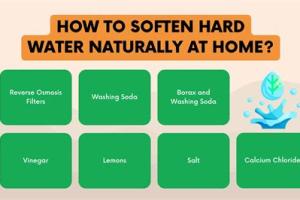10 Natural Ways to Effectively Reduce Water Hardness in Your Home

-
Quick Links:
- Understanding Water Hardness
- The Importance of Soft Water
- Natural Methods to Reduce Water Hardness
- Case Studies and Expert Insights
- Conclusion
- FAQs
Understanding Water Hardness
Water hardness is primarily caused by the presence of dissolved minerals, particularly calcium and magnesium. When water flows through soil and rock, it can dissolve these minerals, leading to hard water. Hard water can cause various issues in your home, including scale buildup in pipes and appliances, soap scum, and reduced efficiency of detergents.
How to Test Water Hardness
Testing your water hardness is simple. You can either use a home test kit, which is widely available at hardware stores, or send a sample to a local water testing laboratory. A measurement of 0-60 mg/L indicates soft water, while anything above 120 mg/L signifies hard water.
The Importance of Soft Water
Soft water is not just better for your plumbing; it also has numerous benefits for your skin, hair, and even your appliances. Soft water allows soap to lather more effectively, leading to better cleaning results. Moreover, it results in fewer soap scum residues and prolongs the lifespan of your appliances.
Natural Methods to Reduce Water Hardness
Here are 10 effective, natural ways to reduce water hardness in your home:
1. Install a Rainwater Harvesting System
Rainwater is naturally soft, making it an excellent alternative for household uses. By setting up a rainwater harvesting system, you can collect and store rainwater for irrigation, washing, and even for your home’s water supply.
2. Use Vinegar
Vinegar is a natural acid that can help dissolve mineral deposits. Add a cup of vinegar to your laundry or when washing dishes to help reduce hardness.
3. Baking Soda
Baking soda can soften water by binding to the minerals. Add 1/2 cup of baking soda to your laundry or dishwashing cycle for a natural softening effect.
4. Lemon Juice
Lemon juice can also help reduce water hardness due to its citric acid content. Use it in your laundry and cleaning processes.
5. Boiling Water
Boiling water precipitates calcium carbonate, which can help reduce hardness. This method is effective for small quantities of water.
6. Water Softening Plants
Certain plants, like the common soapwort, can naturally soften water. Growing these plants in your garden can help filter and soften your water.
7. Use a Water Filter
Investing in a good quality water filter can help remove minerals that cause hardness. Look for filters specifically designed for hard water.
8. Ion Exchange Methods
This method involves exchanging calcium and magnesium ions with sodium or potassium ions. You can use natural zeolite as a medium for ion exchange.
9. Sodium Bicarbonate
Similar to baking soda, sodium bicarbonate can help in softening water. It is often used in swimming pools for this purpose.
10. Essential Oils
While not a direct method of softening water, certain essential oils can enhance the washing experience and might help in reducing the effects of hard water.
Case Studies and Expert Insights
Several households have reported success in reducing water hardness using these natural methods. For instance, the Taylor family from California implemented a rainwater harvesting system and reported a significant decrease in scale buildup in their appliances.
Experts suggest that these natural methods not only help in softening water but also promote a more eco-friendly lifestyle. According to a study published by the Environmental Protection Agency, reducing reliance on chemical water softeners can lead to improved environmental health.
Conclusion
Reducing water hardness naturally is not only beneficial for your household but also an eco-conscious choice. By implementing these methods, you can enjoy the benefits of soft water without the need for chemical treatments. Start with one or two methods and gradually find what works best for your home.
FAQs
1. What causes water hardness?
Water hardness is primarily caused by the presence of calcium and magnesium minerals in the water supply.
2. How can I test my water hardness?
You can test your water hardness using a home test kit or by sending a sample to a laboratory for analysis.
3. Is soft water safe for drinking?
Yes, soft water is safe for drinking, but be cautious with water that has been softened using sodium-based methods if you are on a low-sodium diet.
4. Can boiling water reduce hardness?
Yes, boiling water can precipitate calcium carbonate, which can help reduce water hardness temporarily.
5. Are there any plants that can help soften water?
Yes, certain plants like soapwort can help soften water due to their natural properties.
6. How often should I clean my water filter?
It is recommended to clean or replace your water filter every 3 to 6 months, depending on usage.
7. Can vinegar damage my plumbing?
Vinegar is safe for plumbing in moderation, but excessive use can lead to corrosion in certain types of pipes.
8. Is it better to use chemical water softeners?
Natural methods are generally better for the environment, while chemical softeners can be effective but may have negative environmental impacts.
9. How do essential oils help with hard water?
Essential oils can enhance the washing experience and may help mitigate some effects of hard water, such as soap scum.
10. What is the best natural method to reduce water hardness?
The best method depends on your specific situation, but rainwater harvesting is one of the most effective and sustainable options.
Random Reads
- How to uninstall programs on mac
- Mastering carpet care steam cleaner
- How to make a shutdown button windows computer
- How to make a spreadsheet in excel
- How to restart windows update no download progress
- How to create folders in gmail
- How to create new email account
- How to unblock clogged washing machine drain
- How to set up tekkit server
- How to set up two computers for lan